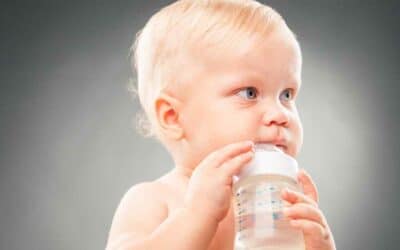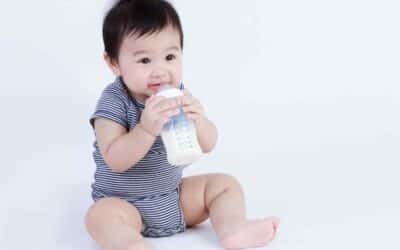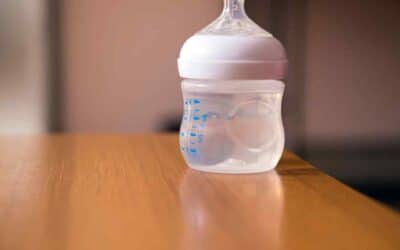All water may look the same, but there are considerable differences in water sources that may affect your baby’s health. Consider this: you’re in the park with your baby while taking a stroll. You noticed you ran out of water to mix the baby formula. But as you go to the nearest store in the area, you start wondering if you can learn how to choose bottled water for babies.
This article has all the information you need. It’ll help you determine which bottled water is best for your baby’s formula! Continue reading if you’re still contemplating the best-bottled water.
Is Bottled Water Safe for Babies?
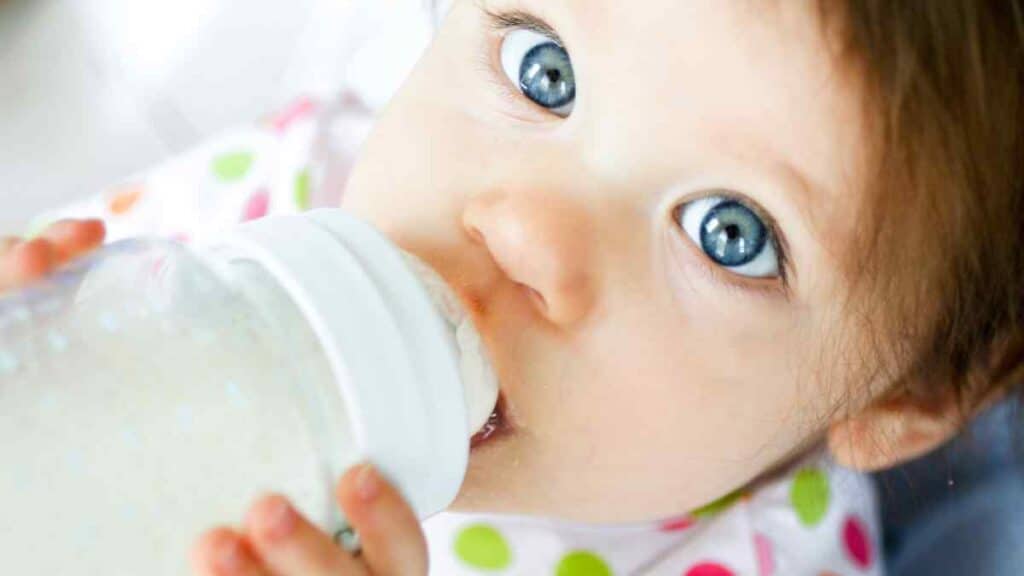
Yes, bottled water is safe for babies older than six months. Although breast milk still plays a crucial role in your child’s nutrition, you may slowly introduce your baby to water if they appear thirsty. Besides a bottle where you prepare infant formula, you can also use a sippy cup to help them drink more easily.
Tap water is a practical way to mix baby formula, but bottled water is safer. Using tap water at home can be an option if you let it boil for several minutes to ensure that all the harmful microbes are gone. But there is more to tap water than meets the eye, which could potentially cause adverse effects on your baby.
The Flouride Levels in Tap Water
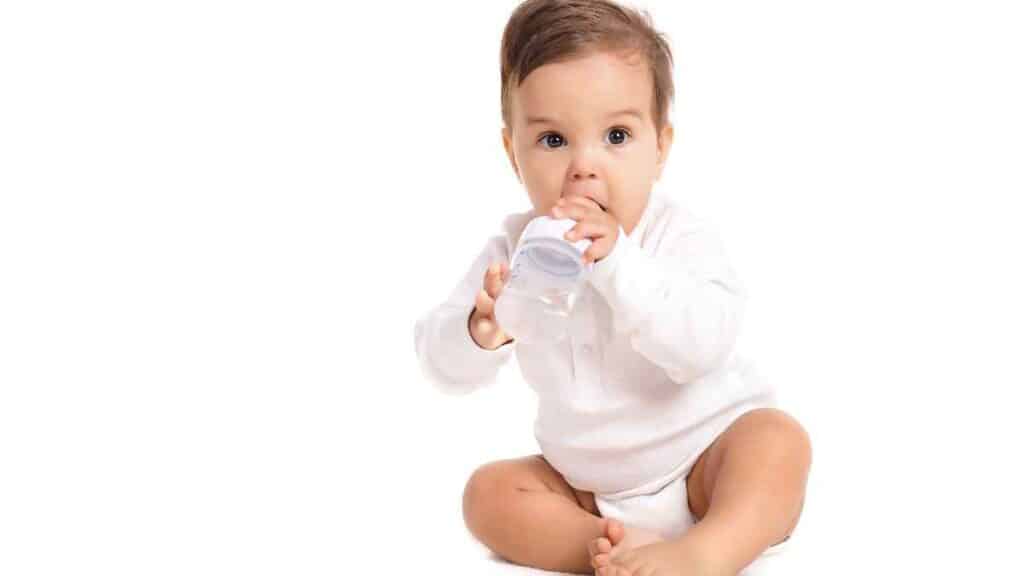
Fluoride is a crucial part of dental health as it protects your teeth from damage caused by plaque and tartar. But when exposed in high amounts, fluoride can also cause fluorosis, especially in developing teeth. Most tap water sources have too much fluoride, which may affect your child’s teeth.
Dental fluorosis is a condition that gradually changes the appearance of a person’s tooth enamel, causing discoloration by creating yellowish streaks on the person’s teeth. Although it isn’t considered a tooth disease, fluorosis can affect your baby’s developing teeth, causing them to appear less healthy. Also, there’s a significant chance that it’ll cause damage to your child’s permanent teeth as it forms inside the gums.
The Right Fluoride Level
Almost every infant formula these days contains the recommended amount of fluoride supplements. As you mix infant formula, it will combine with fluoridated water, which helps reduce the risk of exposing your child to too much fluoride.
For those who are using tap water, it’s highly advisable to check if the fluoride level is less than 0.7 mg/L to keep your child safe from possible exposure [1].
Choosing the Best Bottled Water for Babies
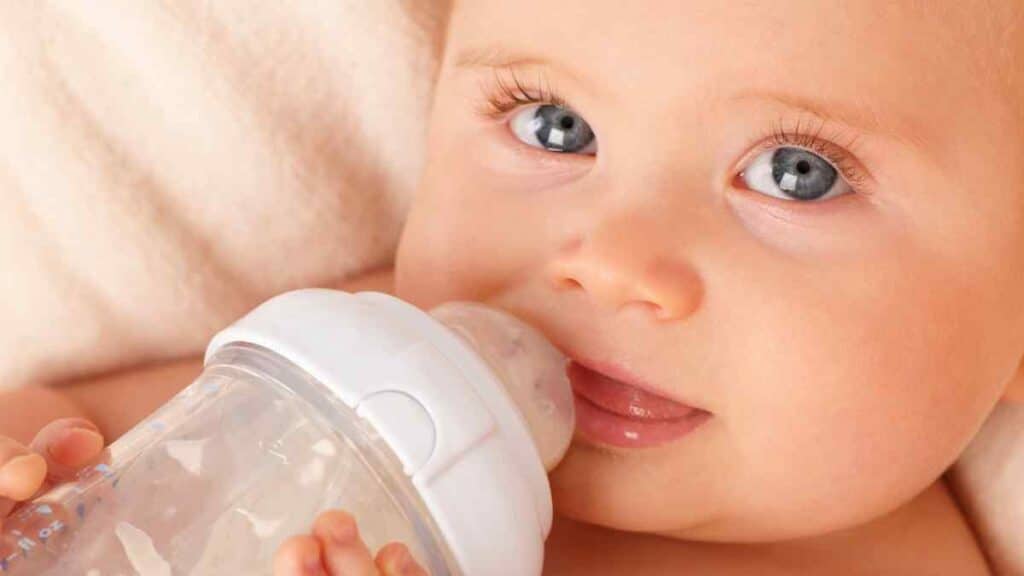
Getting bottled water is the best option for people who don’t have access to their home distillation system or only have access to well water or tap water. Consider getting your supplies from the nursery water products shelf, as these items are explicitly meant for babies.
You can also look for other products labeled as distilled, deionized, or purified. These products went through different water purification processes to ensure their quality.
Although bottled water is safe for your baby’s formula, it’s always best to follow a few safety precautions before giving it to your child. Remember that bottled water may have been on the shelf for months, exposing them to various elements, including pathogens and other microbes. So, it’s best to boil bottled water to be safe.
Different Types of Bottled Water

There are various types of bottled water that you can choose for your baby. Let’s take a closer look at a few of them.
- Packaged Drinking Water: You’ll often find these products under different names, such as packaged or purified water. Companies primarily source them from natural bodies of water such as lakes and rivers. The sourced water undergoes reverse osmosis and UV treatment to eliminate potentially harmful bacteria. Most of these products are marketed as natural mineral waters, giving them a distinct flavor that some people love.
- Mineral Water: Another one on the list is mineral water. This bottled water contains high levels of dissolved minerals mixed with the product. These minerals could be naturally resourced from natural spring water. Manufacturers will sometimes add these minerals to their health values.
- Distilled Water: Lastly is distilled water. Many refer to it as water in its most undiluted form. Because the distillation process effectively removes any potentially harmful minerals and other pathogens from the water, you can guarantee it’s the safest, primarily when used for your baby’s formula. However, it’s rarely available in the market since it’s often used for industrial purposes.
What to Look for In Bottled Water for Babies
Not every bottled water is the same. What may be okay for adults may not necessarily be suitable for babies. So, here are a few factors you can consider when buying bottled water for your baby’s formula.
- Sodium level: Fewer than 250mg per liter
- Sulfate level: Fewer than 250mg per liter
When looking at the packaging, choosing the one that says “low-fluoride” version is best. It commonly has an average of 0.11mg of fluoride for each liter. Choosing these packages will determine how much fluoride is in the bottles when mixing your baby’s formula.
Is It Okay to Boil Bottled Water?
It’s entirely okay to boil low-fluoride bottled water for your baby. Although it already underwent a rigorous purification process, it wouldn’t hurt to take the necessary precautions to ensure your child’s safety.
In most cases, previous product packaging states that all water used for an infant formula mix needs to be boiled. However, most products today will likely show a statement advising you to contact a healthcare provider about whether you should boil the water.
Also, it’s important to remember that boiling water doesn’t remove any chemicals. So, there’s still a chance of contamination even after boiling it. So, choosing bottled water from your trusted brand is essential only to ensure its quality.
Simple Steps to Mixing Infant Formula
Preparing your baby’s infant formula should be easy, especially if you follow the packaging instructions. Here are a few tips that you can consider when mixing baby formula:
- Start with the water: When preparing baby formula, you must ensure that you’re putting the drinking water in the bottle first and not the other way around. Doing so will help you mix the baby formula better.
- Boil the water if necessary: If you feel at ease with boiling water, do so, especially if you think it’s been contaminated. Once the water has reached its boiling point, let the boiled water cool for five minutes before storing it in a sterilized bottle. It’s highly advisable to do it when using tap water or underground water.
- Shake a few drops: It’s an age-old technique that still works today. To ensure that your baby’s formula is at the right temperature, consider shaking a few drops on your wrists to see if it’s higher than your body temperature. Remember to cool the boiling tap water before putting it in the bottle. You can run it through the faucet drinking water or place it in an ice bucket.
- Get rid of any leftovers: There will be times when your baby might have leftovers from their bottles that they can no longer consume. So, after feeding your baby, it’s best to discard everything that’s left within an hour of feeding your baby.
What if I Have No Choice but to Use Tap Water in Making Baby Formula
It’s crucial to remember that the quality of drinking water plays a significant role in preparing your baby’s formula. If you don’t have access to bottled water, there are a few precautionary steps you can take to ensure that your baby receives safe and clean formula when using tap water.
- Filter the tap water: To eliminate contaminants from the tap water, it’s essential to run it through a filtration system. If you don’t have one installed in your home, consider obtaining a portable alternative, such as a Brita pitcher or a faucet-mounted filtration system. Many grocery stores and supermarkets offer filtered water dispensers as well. Running your tap water through a filter helps remove contaminants, including chlorine, heavy metals, and certain bacteria that might be present in your water supply.
- Boil the tap water: Before making the formula, be sure to boil the tap water for at least one minute. This process will kill any remaining pathogens (bacteria, parasites, or viruses) that may be present in the water supply. After you have boiled the water, let it cool down and sit undisturbed for about 30 minutes. This will help bring the water to a safe, manageable temperature while also allowing any sediment or particles to settle at the bottom of the container. Avoiding this sediment will further reduce potential contaminants.
- Check with your local water supply agency: It’s necessary to stay informed about the quality of the tap water in your region. Local water supply agencies generally provide water quality reports that contain information about the levels of various contaminants in the tap water. Familiarize yourself with these reports and, if you’re concerned, consult healthcare professionals or your baby’s pediatrician for guidance.
Taking these steps ensures that tap water can be a suitable temporary alternative for your baby’s formula preparation. The process involves filtering the water to remove most contaminants, boiling it to eliminate any harmful pathogens, and familiarizing yourself with local water supply reports to remain informed about your tap water’s quality. If in doubt, always consult a healthcare professional or your baby’s pediatrician to assess the best course of action for your baby’s nutritional needs. This way, you can ensure the safest possible formula for your child even when using tap water.
Which Types Of Bottled Water To Avoid When Making Baby Formula
Baby formula is so important for your baby’s health, so it’s no surprise that you want to make sure your baby’s water is safe and clean. But what type of water for babies should you use?
It’s beneficial to use bottled water when you’re making baby formula. However, there are some types of packaged drinking water you should avoid.
Natural Mineral Waters and Spring Water
Natural mineral waters and spring water are often sourced from underground reservoirs and springs, hence the name. These types of water are unique in that they retain naturally occurring minerals and salts like calcium, magnesium, and potassium. While these minerals might be beneficial for adults due to their various physiological roles, they aren’t necessarily needed in the diet of infants, especially in high quantities. Babies are still developing their kidneys, which can be affected negatively by an overload of these minerals. This might lead to kidney stones, an issue that’s relatively rare but could be serious in infants. In such instances, distilled or purified water would be a safer alternative for babies.
Low Fluoride Bottled Water
Low fluoride bottled water, while relatively low in fluoride levels compared to regular tap water, is still not recommended for infant consumption. Fluoride is a mineral that is beneficial in preventing tooth decay, but too much of it may lead to a condition known as fluorosis. In mild cases, fluorosis can cause faint white lines or streaks to appear on a child’s teeth. However, in severe cases, it can lead to staining or pitting on the tooth surface. Infants are particularly susceptible to fluorosis because their baby teeth are still developing. Moreover, their small size means that what constitutes a “low” level for adults may actually be a relatively high dose for them. Therefore, even when considering low fluoride bottled water, parents should be mindful of their babies’ fluoride consumption and consider using a fluoride-free water source for formula preparation.
Conclusion
Bottled drinking water is an excellent choice for babies, especially for parents who only want the best for their kids. Although you can still use tap water (as long as it’s treated)when preparing infant formula, choosing distilled bottled water is healthier.
Meanwhile, you can always get in touch with your baby’s doctor for an alternative source of fluoride. It’s also highly advisable to get low-fluoride bottled water if you’re primary water source is a well. Doing so ensures that your child won’t get exposed to harmful bacterial contamination and other water-related diseases that may affect your child’s health.
I hope this article was helpful. If you have any questions, let me know in the comments below!

